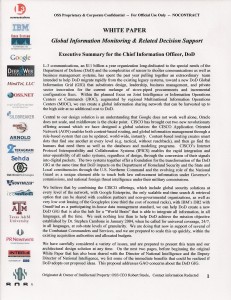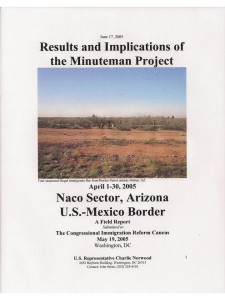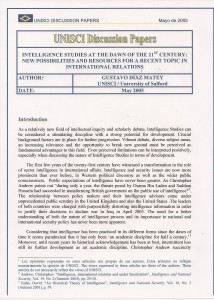
L-3 funded the first draft of this White Paper. It remains the intellectual property of Robert Steele and OSS.Net, Inc.
|
2005 |
US |
Collective Intel | Atlee | Great Quotes on Collective Intelligence |
|
2005 |
US |
Collective Intel | Atlee | Strands of Collective Intelligence |
|
2005 |
US |
Collective Intel | Atlee | World Café Process |
|
2005 |
US |
Collective Intel | Atlee | World Café Book Reivew |
|
2005 |
US |
Collective Intel | Atlee | Update of June 2005 |
|
2005 |
US |
Collective Intel | Atlee | On Public Engagement |
|
2004 |
US |
Collective Intel | Atlee | Definitions of Collective Intelligence |
|
2004 |
US |
Collective Intel | Atlee | National Collaboration Wiki (on Any Topic) |

Representative Rob Simmons (R-CT-02) Obtains 417 House Votes In Favor of Open Source Intelligence (OSINT) as Essential Part of Reform Effort
WASHINGTON, June 26 /PRNewswire/ — According to Robert David Steele Vivas, CEO of OSS.Net, Inc., a global commercial intelligence corporation, “Representative Rob Simmons is going to be a vital contributor to Congressional deliberations on reform of the U.S. Intelligence Community.” The House of Representatives passed by a vote of 417 to 1 his amendment to bolster our national security and strengthen our nation's intelligence capabilities. The Simmons amendment directs the Director of Central Intelligence to focus on the importance of Open Source Intelligence (OSINT), and report to Congress in six months on the progress being made in using this under-utilized intelligence discipline. The lawmaker's amendment was incorporated into H.R. 4548, the “Intelligence Authorization Act for Fiscal Year 2005,” which passed the House by a vote of 360-61. According to Steele, “The Simmons amendment enables a conference discussion on OSINT, and makes possible the establishment of a national OSINT program as part of the final legislation. We who have advocated OSINT reform since 1988 are explicitly seeking $125 million per year for an independent field activity of the Department of Defense, with $10 million per year multinational OSINT collection centers in each theater of operations.”
“The ‘information explosion' has dramatically increased both the quality and quantity of the information available in the public sector,” Simmons said. “Because this information is unclassified, it can be shared quickly and freely, and acted upon. Unfortunately, our country's intelligence service has under-utilized OSINT. The time has come to revisit the importance of Open Source Intelligence. It not only saves time and money, it saves lives.”
ABOUT CONGRESSMAN ROB SIMMONS: Congressman Rob Simmons served 37 years in the U.S. Army, starting as a Private and retiring in 2003 as a Colonel. He earned two Bronze Star Medals for his service in Vietnam. He is one of only two Members of Congress with clandestine experience, serving ten years in the CIA's Directorate of Operations. He worked with Senator Barry Goldwater and with Bill Casey from 1981-1985, while Staff Director of the Senate Select Committee on Intelligence. He is a member of the House Armed Services Committee. His press representative is Meghan Curran, who can be reached at (202) 225-2076.

Key Finding:
A successful immediate replication of the Minuteman Project would require an average 12 –24 enforcement personnel per mile, or around 36,000 total additional personnel to adequately secure the entire 2,000 mile southern border. An additional 12,000 support personnel may be necessary to provide services over an extended deployment.

Phi Beta Iota: Gustavo Diaz Matey is the author of the two definitive modern works on intelligence out of Spain,
pending citations from author
Among many strong observations in the reference are his statement on page 2,
Intelligence is all but absent, in the work of most international relations theorists and it does not figure in any key International relations theory debates between realist, liberal, institutionalism, constructivist and postmodernist approaches.
Contents:
1. Intelligence and the study of International Relations
2. A Starting Point. What is intelligence?
3. Popular Culture and Intelligence
4. Is secrecy the main characteristic of intelligence and the main limitation of intelligence studies?
5. The open source revolution (OSINT)
6. Declassification